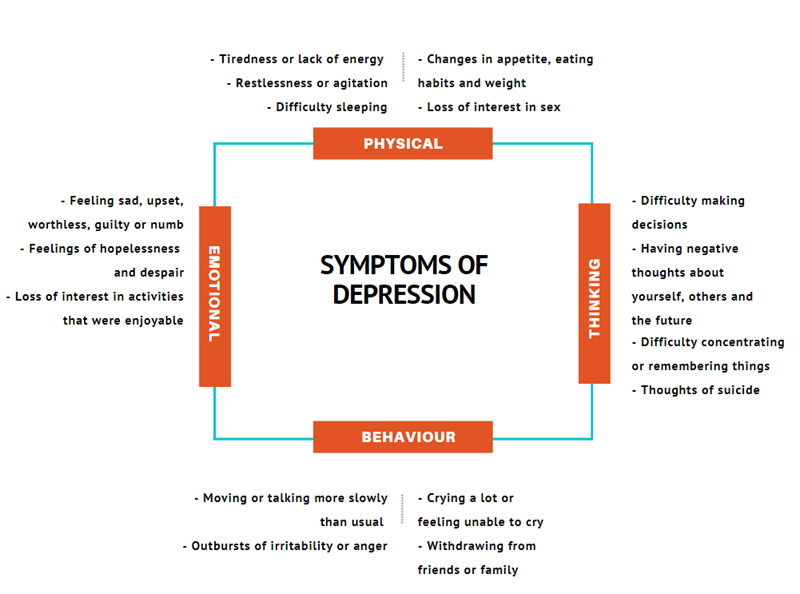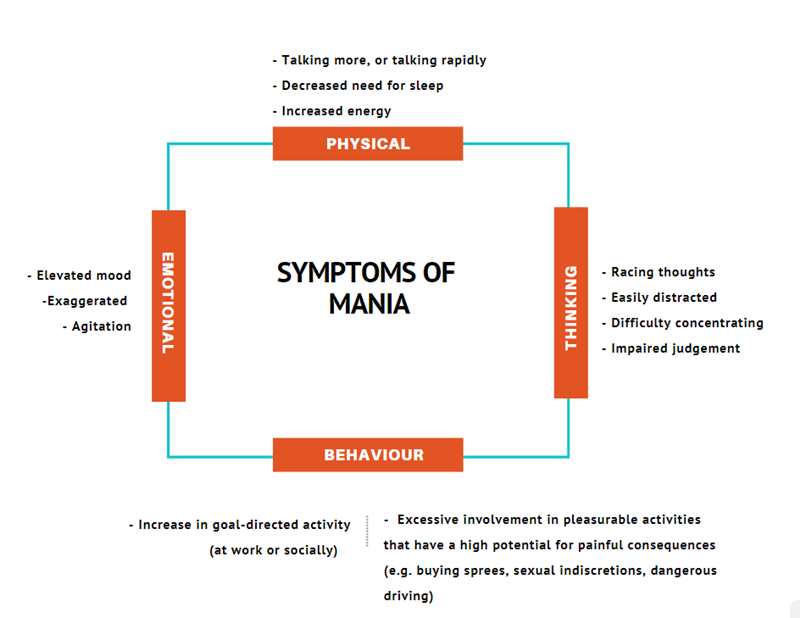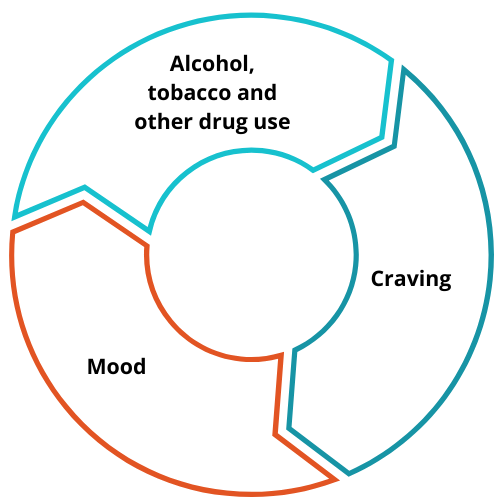What is mood?
Moods are an ordinary part of your flow of emotional states. Generally, moods last longer than emotions, are less specific, less intense, and aren’t necessarily attached to a particular person, situation, or event. Whilst specific emotions such as anger, excitement or happiness tend to come and go, extreme moods which may last for days at a time, can have a serious impact on your daily life.
Strong moods can cause problems with people’s everyday life, as things like work, school, and relationships with family and friends can be negatively affected. If a person’s everyday life is seriously affected by ongoing moods, they may be experiencing a 'mood disorder'.

What are mood disorders?
There are two main types of mood disorders, which impact people in different ways. These include:
- Depression.
- Bipolar disorder.
What is depression?
Depression can severely impact the way you think, behave and feel. Common symptoms of depression are shown below:

What is bipolar disorder?
People with bipolar disorder may have periods of extreme moods where they either feel very active and excited (e.g., 'mania') or feel very low and experience depressive states. Common symptoms of bipolar are shown below. 
Similar to depression, bipolar can strongly impact the way a person thinks, acts, feels and talks. Periods of mania (sometimes called ‘manic’ behaviour) can have the opposite effect of depression, which still causes serious problems for a person’s daily life.
Bipolar may cause people to experience mania without periods of depression, or they may also experience depression as well.
How common are mood disorders?
Mood disorders affect as many as 6% of Australians. Around 5% experience depression each year, whilst about 1% experience bipolar disorder.
Mood disorders are even more common in people who experience issues with alcohol and/or other drugs. Up to 17% of people who have an alcohol and/or other drug disorder also experience depression, and over 4% experience bipolar.
Remember, if you are currently experiencing a mood disorder, you are not alone.
What causes a mood disorder?
Mental health professionals cannot narrow down a mood disorder to one single cause. There are several factors that usually contribute to a person’s mood disorder. These include:
- Family history of depression and mood disorders.
- Chemical imbalances in the brain.
- Life experiences (e.g., stress)
- Significant life events (e.g., childbirth, menopause, grief or mourning the loss of a loved one).
- Alcohol and/or other drug use.
Mood disorders and co-occurring substance abuse
To cope with depression or manic states, some people use alcohol and/or other drugs. This is known as ‘self-medication’. Although this may bring short-term relief, it may actually make a person’s long term condition worse.
Symptoms of depression and bipolar can also be made worse when using or withdrawing from alcohol, tobacco and/or other drugs. This can develop into a dangerous cycle where a person’s mood disorder and substance use feed off each other. Alcohol and other drugs may become ways to cope, and so the amount a person drinks or uses increases over time.

How are mood disorders treated?
Mood disorders are usually treated through either psychological therapy, medication or a combination of both. Often when a person learns how to better manage and respond to moods, their substance use becomes easier to manage as well.
Psychological therapies
These types of treatments focus on changing negative patterns of thinking, beliefs and behaviours. For example, Cognitive Behavioural Therapy (CBT) is a common treatment for depression and bipolar disorder. This approach can also be helpful in treating substance use issues where people have trouble breaking the habit of using alcohol and/or other drugs. CBT can be used to target both substance use and mood disorders at the same time.
Medication
For some people, medication may be helpful alongside psychological therapies. Mood stabilisers and antidepressants can help restore normal sleeping and eating patterns and reduce feelings of anxiety. Although medication can be helpful in managing mood disorders, in some cases people may experience unexpected, unpleasant side effects. Always tell your doctor immediately if you experience any negative side effects or are using other substances at the time you are prescribed medication.
Tips for staying well
Spot the early warning signs
If you are able to identify and recognise the signs of an episode of depression or mania, you may be better able to manage these periods. Thinking carefully about the signs and symptoms you have experienced in the past will help you to learn when warning signs are appearing. Common warning signs for depression include trouble sleeping, avoiding meals, staying in bed, difficulty concentrating, and feeling like you want to cry. Common warning signs of a manic state include disrupted sleep, jumbled thought patterns, a sense of urgency, uncontrollable energy or impulsiveness and agitation.
Take care of yourself
This includes regularly eating healthy foods and getting plenty of exercise. By maintaining a healthy and active lifestyle, you can create an outlet for stress that can also elevate your mood.
Plan to do something you enjoy every day
This doesn’t need to be expensive, or a big deal. Just focus on activities that make you feel good and help you to take your mind off negative thoughts.
Techniques for staying well
There are techniques you can learn and apply that will help to ease the feelings of distress associated with traumatic experiences. The following techniques will provide the best results when applied over time, so don’t give up if you don’t start to see results immediately. Staying well takes time and effort - click and practice the below techniques regularly and often for the best results.
Self-soothing
This technique helps you to calm and relax yourself. By incorporating a strong focus on your sensory experience and thought patterns, over time, you can develop strategies for remaining calm during stress.
Coping with cravings
Cravings are sometimes unavoidable and can be overwhelming if you don’t have a way to cope with them effectively. This resource will provide you with some techniques to shift your attention away from the cravings until the feeling subsides and you are able to carry on with your day.
Mindful listening
These exercises help to become aware of your surrounding environment and tune in to the sensations you feel. In doing so, mindful listening can clear repetitive and unwanted thoughts that may be affecting your mood.
Where can you get help?
In an emergency, call Triple Zero (000).
You can also contact your local GP, or call/click the following services:
Beyond Blue: 1300 22 4636
eCliPSE Service Locator
Kids Helpline: 1800 55 1800
Lifeline: 13 11 14
National Alcohol and Other Drug Hotline: 1800 250 015